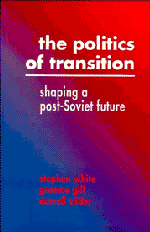Book contents
- Frontmatter
- Contents
- Preface
- 1 Beyond Marxism
- 2 Reforming the electoral system
- 3 Structures of government
- 4 The Presidency and central government
- 5 From union to independence
- 6 Patterns of republic and local politics
- 7 The withering away of the party
- 8 The emergence of competitive politics
- 9 The politics of economic interests
- 10 Public opinion and the political process
- 11 Letters and political communication
- 12 The Soviet transition and ‘democracy from above’
- Notes
- Index
10 - Public opinion and the political process
Published online by Cambridge University Press: 27 August 2009
- Frontmatter
- Contents
- Preface
- 1 Beyond Marxism
- 2 Reforming the electoral system
- 3 Structures of government
- 4 The Presidency and central government
- 5 From union to independence
- 6 Patterns of republic and local politics
- 7 The withering away of the party
- 8 The emergence of competitive politics
- 9 The politics of economic interests
- 10 Public opinion and the political process
- 11 Letters and political communication
- 12 The Soviet transition and ‘democracy from above’
- Notes
- Index
Summary
A measure of how much Soviet politics changed in the critical period from 1988 to 1991 was the increasing importance of public opinion. Popular attitudes were reflected, of course, in the local and national elections and in the national and republican referenda that are discussed elsewhere in this volume. The national, republic and local elections were, at best, highly imperfect snapshots of public opinion that was rapidly shifting. More systematic monitoring of public opinion was another innovation of the Gorbachev period, and this chapter focuses on both the study of public opinion and how public opinion changed in the period under review.
Glasnost and the changing Soviet media
Gorbachev's emphasis on increasing openness or glasnost in the media was perhaps the single most important factor in changing and mobilising Soviet public opinion. The more open discussion of social problems, particularly from 1987 on, was one of Gorbachev's first political reforms. In the past, journalists' roles were heavily linked to supporting the status quo and its ideology as directed by the Communist Party apparatus that controlled their activities. None the less, many journalists were strong supporters of reform, and with the shift in policy under Gorbachev, they were given much greater freedom to explore areas that had been off-limits in the past.
At first there were significant limits to glasnost.
- Type
- Chapter
- Information
- The Politics of TransitionShaping a Post-Soviet Future, pp. 178 - 192Publisher: Cambridge University PressPrint publication year: 1993



